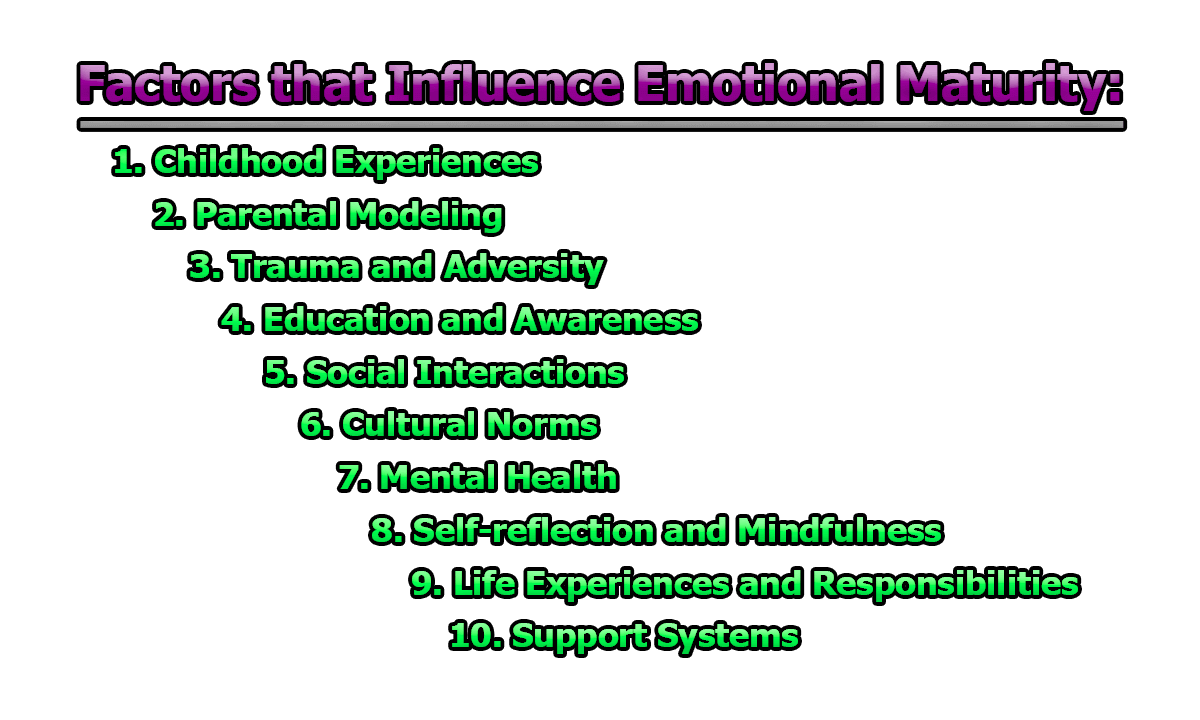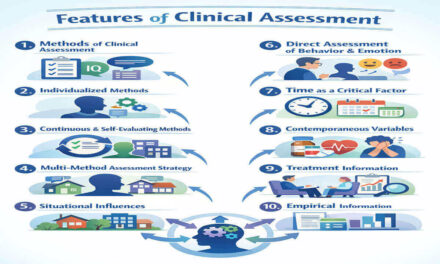Factors that Influence Emotional Maturity:
Emotional maturity is a vital aspect of personal and social development, enabling individuals to manage emotions effectively, maintain healthy relationships, and navigate life’s challenges with resilience. Our emotional maturity is influenced by several factors, each contributing uniquely to our ability to understand and manage emotions. In the rest of this article, we will explore some of the essential factors that influence emotional maturity.
1. Childhood Experiences: Early relationships with caregivers set the foundation for emotional development (Pollak, 2003). The emotional environment that we grow up in profoundly impacts our ability to develop healthy emotional responses and coping mechanisms. Positive early interactions can lead to secure attachment and emotional stability, while childhood emotional neglect or inconsistent care can hinder emotional growth. Research suggests that children who experience secure attachments with their caregivers tend to develop better emotional regulation skills and higher levels of empathy in adulthood (Ainsworth & Bowlby, 1991). On the other hand, those who experience neglect or inconsistent caregiving may struggle with emotional regulation, leading to challenges in personal relationships and self-awareness.
2. Parental Modeling: Observing and mimicking the emotional responses and coping mechanisms of our parents and caregivers plays a critical role in shaping our emotional development (Hajal & Paley, 2020). We learn how to handle our emotions by watching how our parents and caregivers deal with stress, express emotions, and interact with others. If parents model healthy emotional regulation, such as expressing emotions constructively and demonstrating resilience in difficult situations, their children are more likely to develop emotional maturity. However, poor parental modeling, such as outbursts of anger, avoidance of emotional expression, or unhealthy coping strategies like substance abuse, can lead to maladaptive emotional behaviors in children. Studies have found that children raised in emotionally supportive households develop stronger interpersonal skills and greater emotional intelligence later in life (Gottman et al., 1997).
3. Trauma and Adversity: Experiencing significant stress or trauma can impact emotional growth, either stunting or accelerating maturity (Sudbrack et al., 2015). If someone is exposed to trauma, they may develop heightened emotional responses or, conversely, may become emotionally resilient through overcoming adversity. The nature and extent of trauma influence how it affects emotional development. Some individuals develop adaptive coping mechanisms that foster resilience and emotional strength, while others may struggle with emotional dysregulation or post-traumatic stress symptoms. Research suggests that early intervention and therapy can help mitigate the negative effects of trauma and promote healthier emotional development (van der Kolk, 2014).
4. Education and Awareness: Learning about emotional intelligence and healthy coping strategies can foster maturity. By providing education about emotions and proactive emotional management, individuals can enhance their ability to handle emotional challenges effectively (Kaur et al., 2015). Programs focused on emotional intelligence can equip individuals with the tools necessary for emotional growth. Studies show that individuals who actively engage in emotional intelligence training exhibit improved self-awareness, better stress management, and increased interpersonal effectiveness (Goleman, 1995). Formal education, self-help resources, and therapy can all contribute to this learning process.
5. Social Interactions: Positive and negative interactions with peers influence emotional development. Social experiences, such as friendships, conflicts, and collaborations, help individuals learn how to navigate emotional landscapes (Berry & Hansen, 1996). These interactions teach important lessons about empathy, communication, and conflict resolution, all of which are crucial for emotional maturity. People who engage in healthy social interactions tend to develop better emotional regulation and problem-solving skills. Conversely, individuals who experience social isolation or negative peer interactions may struggle with emotional expression and regulation. Research indicates that strong social support networks are linked to increased emotional resilience and psychological well-being (Cohen & Wills, 1985).
6. Cultural Norms: Cultural background and societal expectations shape how emotions are expressed and managed. Yang and Wang (2019) explain that cultural norms dictate acceptable emotional behaviors and influence emotional regulation strategies. In some cultures, open emotional expression is encouraged, while in others, emotional restraint is valued. Understanding these cultural influences helps individuals navigate emotional expectations and adapt accordingly. For instance, collectivist cultures often emphasize group harmony and emotional suppression, whereas individualistic cultures may encourage emotional expression and self-assertion. Recognizing and adapting to these differences can enhance cross-cultural emotional intelligence and improve interpersonal relationships.
7. Mental Health: Conditions such as anxiety, depression, and personality disorders can significantly impact emotional regulation. These mental health challenges can interfere with an individual’s ability to process emotions effectively, leading to impulsive reactions, difficulty managing stress, and challenges in forming healthy relationships (Poole et al., 2017). Addressing mental health issues through therapy, medication, or lifestyle changes is essential for fostering emotional maturity. Research suggests that individuals who seek mental health support and participate in cognitive-behavioral therapy (CBT) or dialectical behavior therapy (DBT) develop better coping strategies, improving their ability to manage emotions effectively (Linehan, 1993). Furthermore, practicing self-care strategies such as exercise, adequate sleep, and maintaining a balanced diet can also contribute to better emotional regulation and stability.
8. Self-reflection and Mindfulness: Practicing self-awareness and mindfulness allows individuals to recognize their emotions and respond to them appropriately. Kabat-Zinn (2015) highlights that mindfulness techniques help develop greater emotional regulation and self-control. Through self-reflection, individuals can analyze their emotional responses to different situations, identify patterns in their behavior, and make conscious efforts to improve emotional intelligence. Regular mindfulness practices, such as meditation, deep breathing exercises, or journaling, have been linked to increased emotional intelligence and stress resilience. Studies indicate that individuals who engage in daily self-reflection and mindfulness exercises show lower levels of emotional reactivity and greater adaptability in stressful situations (Brown & Ryan, 2003). Moreover, mindfulness practices encourage emotional detachment from negative thoughts, allowing individuals to respond to emotions in a more balanced and composed manner.
9. Life Experiences and Responsibilities: Navigating life challenges, making decisions, and taking on responsibilities contribute significantly to emotional growth. As individuals transition through different life stages, they encounter situations that require emotional regulation, problem-solving, and resilience (Baltes & Smith, 2004). Responsibilities such as managing finances, maintaining relationships, raising children, and handling work-related stress demand emotional intelligence and adaptability. Research indicates that individuals who actively engage in problem-solving, decision-making, and accountability develop stronger emotional regulation skills over time (Heckhausen et al., 2010). Learning from failures and setbacks is another crucial aspect of emotional maturity; embracing challenges rather than avoiding them builds resilience and enhances one’s ability to cope with adversity. Furthermore, taking responsibility for one’s actions and decisions fosters self-awareness and emotional growth, leading to greater stability in personal and professional life.
10. Support Systems: Having a strong support system consisting of family, friends, mentors, or therapists plays a significant role in emotional development. Social support provides encouragement, guidance, and reassurance, which enhances emotional resilience and overall well-being (Cohen & Wills, 1985). Individuals who receive consistent emotional support are more likely to develop a secure sense of self, allowing them to handle stress and adversity effectively. Studies have shown that people with strong social connections tend to experience lower levels of stress, anxiety, and depression, leading to better emotional stability (House et al., 1988). Additionally, support systems contribute to emotional regulation by offering perspective and constructive feedback. Engaging in open and honest conversations with trusted individuals can help process difficult emotions, reinforce positive behaviors, and encourage personal growth. Furthermore, seeking professional counseling or participating in support groups can provide additional resources for managing emotions and developing healthier coping mechanisms.
At the end of the day, we can say that emotional maturity is not a fixed trait but a continuous process of growth shaped by various internal and external factors. From early childhood experiences to lifelong learning and social interactions, these factors collectively contribute to an individual’s ability to regulate emotions and respond to life’s challenges. Mental health, self-reflection, and strong support systems are particularly fundamental in fostering emotional resilience. By actively addressing these influences and making conscious efforts to improve emotional intelligence, individuals can cultivate a more balanced and mature approach to their emotions, leading to personal growth and healthier relationships.
Frequently Asked Questions (FAQs):
What is emotional maturity?
Emotional maturity refers to an individual’s ability to understand, regulate, and express emotions in a balanced and constructive manner. It involves self-awareness, resilience, and the capacity to handle interpersonal relationships with empathy and responsibility.
How does mental health affect emotional maturity?
Mental health plays a crucial role in emotional development. Conditions like anxiety and depression can hinder emotional regulation, while seeking therapy and adopting healthy coping strategies can enhance emotional maturity.
Can emotional maturity be developed over time?
Yes, emotional maturity is not fixed; it develops throughout life. Engaging in self-reflection, practicing mindfulness, learning from life experiences, and building strong support systems can all contribute to emotional growth.
How do childhood experiences shape emotional maturity?
Early interactions with caregivers and the emotional environment during childhood play a foundational role in emotional development. Secure attachments foster emotional stability, while neglect or inconsistent care can lead to emotional difficulties.
What role do social interactions play in emotional growth?
Engaging with others through friendships, conflicts, and collaborations helps individuals learn about empathy, communication, and conflict resolution, all of which contribute to emotional maturity.
How can self-reflection improve emotional maturity?
Self-reflection allows individuals to assess their emotional responses, recognize patterns in behavior, and make conscious efforts to regulate their emotions more effectively.
Why is cultural background important in emotional development?
Cultural norms shape how individuals express and manage emotions. Different cultures have distinct emotional regulation strategies, and understanding these norms can influence emotional maturity.
How do life experiences contribute to emotional development?
Facing challenges, making decisions, and taking on responsibilities teach emotional resilience and adaptability, helping individuals grow emotionally.
What is the importance of a strong support system in emotional maturity?
Having supportive family members, friends, mentors, or therapists provides encouragement, guidance, and reassurance, helping individuals regulate emotions and navigate life’s challenges more effectively.
References:
- Ainsworth, M. S., & Bowlby, J. (1991). An ethological approach to personality development. American Psychologist, 46(4), 333–341. https://doi.org/10.1037/0003-066X.46.4.333
- Baltes, P. B., & Smith, J. (2004). Lifespan psychology: From developmental contextualism to developmental biocultural co-constructivism. Research in Human Development, 1(3), 123–144. https://doi.org/10.1207/s15427617rhd0103_1
- Berry, D., & Hansen, J. (1996). Positive affect, negative affect, and social interaction. Journal of Personality and Social Psychology, 71, 796–809. https://psycnet.apa.org/buy/1996-06401-014
- Brown, K. W., & Ryan, R. M. (2003). The benefits of being present: Mindfulness and its role in psychological well-being. Journal of Personality and Social Psychology, 84(4), 822–848. https://doi.org/10.1037/0022-3514.84.4.822
- Cohen, S., & Wills, T. A. (1985). Stress, social support, and the buffering hypothesis. Psychological Bulletin, 98(2), 310–357. https://doi.org/10.1037/0033-2909.98.2.310
- Goleman, D. P. (1995). Emotional intelligence: Why it can matter more than IQ for character, health and lifelong achievement. New York: Bantam Books.
- Gottman, J. M., & DeClaire, J. (1997). Raising an Emotionally Intelligent Child: The Heart of Parenting. New York: Simon & Schuster.
- Hajal, N., & Paley, B. (2020). Parental emotion and emotion regulation: A critical target of study for research and intervention to promote child emotion socialization. Developmental Psychology, (56)3, 403–417. https://doi.org/10.1037/dev0000864
- Heckhausen, J., Wrosch, C., & Schulz, R. (2010). A motivational theory of life-span development. Psychological Review, 117(1), 32–60. https://doi.org/10.1037/a0017668
- House, J. S., Landis, K. R., & Umberson, D. (1988). Social Relationships and Health. Science, 241, 540-545. http://dx.doi.org/10.1126/science.3399889
- Kabat-Zinn, J. (2015). Mindfulness. Mindfulness, 6, 1481–1483. https://doi.org/10.1007/s12671-015-0456-x
- Kaur, T., Maheshwari, S., Bahetra, M., & Kaur, M. (2015). Effectiveness of psycho-education on emotional maturity of adolescents. International Journal of Nursing Education, 7, 280–285. https://doi.org/10.5958/0974-9357.2015.00119.1
- Linehan, M. M. (1993). Cognitive-behavioral treatment of borderline personality disorder. Guilford Press.
- Pollak, S. (2003). Experience‐dependent affective learning and risk for psychopathology in children. Annals of the New York Academy of Sciences, 1008(1), 102–111. https://doi.org/10.1196/annals.1301.011
- Poole, J., Dobson, K., & Pusch, D. (2017). Anxiety among adults with a history of childhood adversity: Psychological resilience moderates the indirect effect of emotion dysregulation. Journal of Affective Disorders, 217, 144–152. https://doi.org/10.1016/j.jad.2017.03.047
- Sudbrack, R., Manfro, P., Kuhn, I., Carvalho, H., & Lara, D. (2015). What doesn’t kill you makes you stronger and weaker: How childhood trauma relates to temperament traits. Journal of Psychiatric Research, 62, 123–129. https://doi.org/10.1016/j.jpsychires.2015.01.001
- van der Kolk, B. A. (2014). The Body Keeps the Score: Brain, Mind, and Body in the Healing of Trauma. Penguin Books.
- Yang, Y., & Wang, Q. (2019). Culture in emotional development. In V. LoBue, K. Pérez-Edgar, & K. A. Buss (Eds.), Handbook of emotional development (pp. 569–593). Springer. https://doi.org/10.1007/978-3-030-17332-6_22

Library Lecturer at Nurul Amin Degree College










